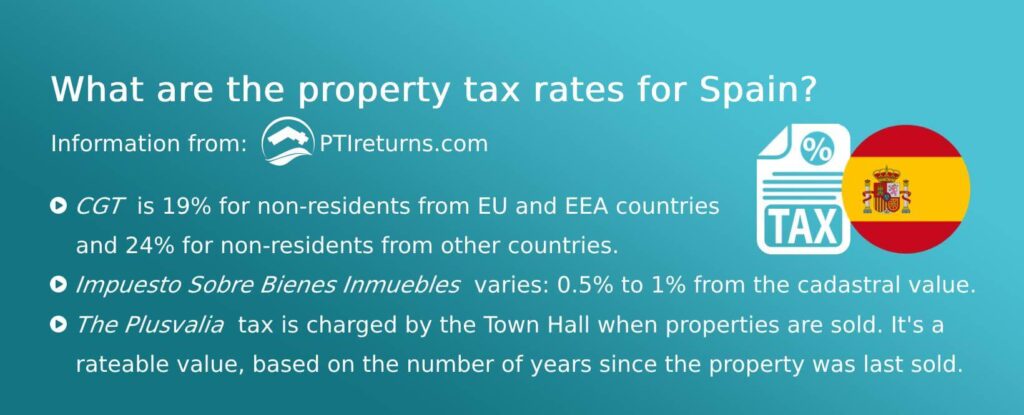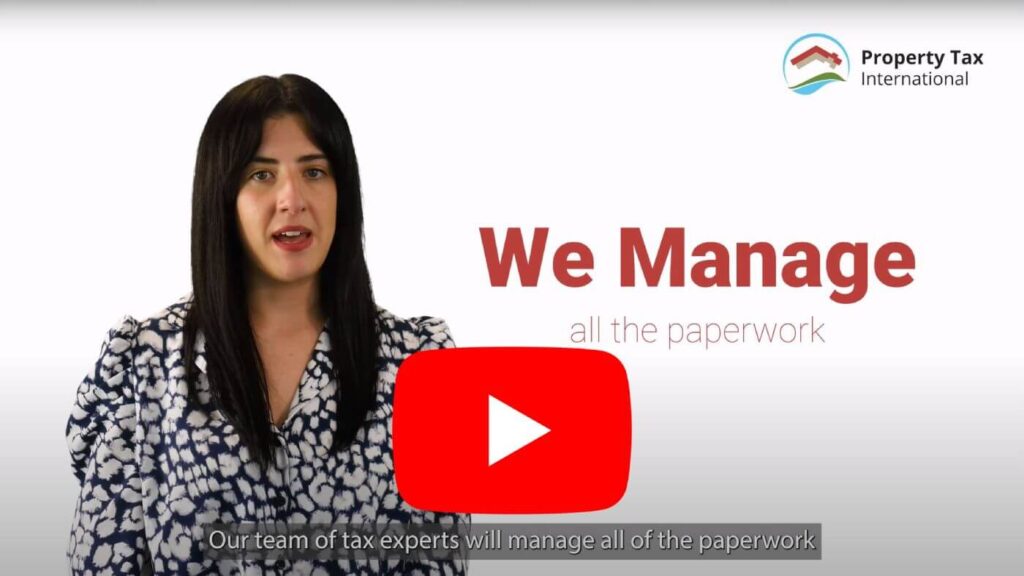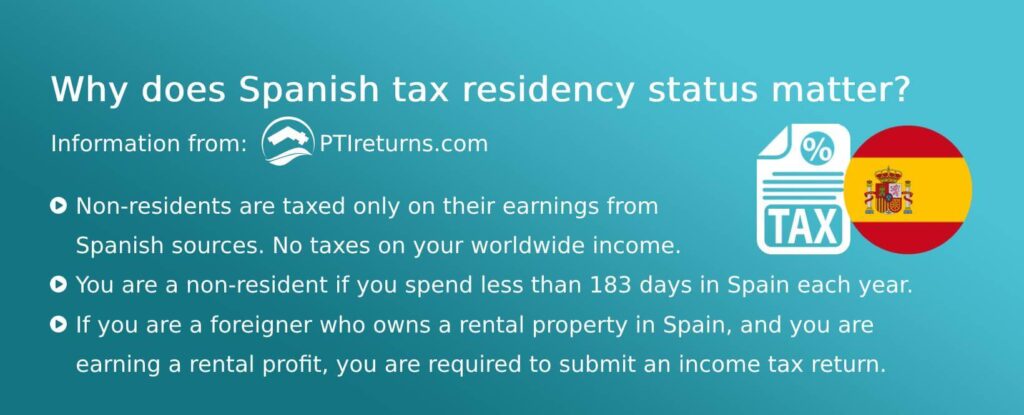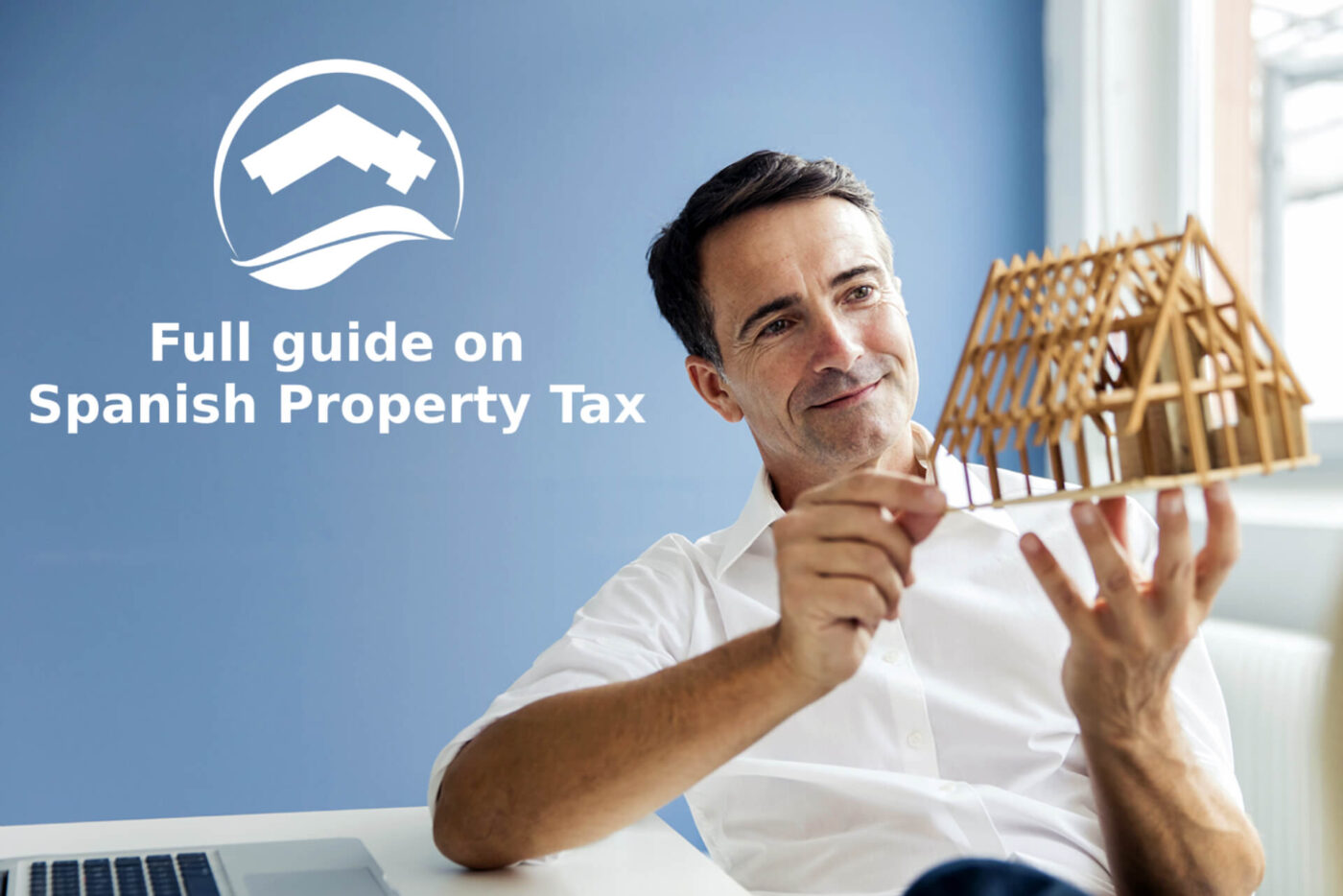When you purchased your property you were likely assigned a foreigner’s ID number (NIE).
In other words, in most cases, property owners will already be registered for tax.
What should I do if I receive a claim for non-resident income tax in Spain?
You should act fast to prevent further fines related to Spanish non-resident income tax.
You will have to complete and file the Spanish income tax returns and make a payment of the tax due within the time frame given in the claim.
To avoid future penalties and interest, you will have to submit your Spanish non-resident income tax return and pay the tax on time.
I am a joint owner of a property. Do both owners need to submit more than one return?
Yes, each joint owner of the property is required to submit a separate return.

What is the Spanish Wealth Tax?
In Spain, the wealth tax (also known as “Impuesto de Patrimonio“) is a tax on assets that both residents and non-residents must pay.
We’re talking about an individual tax that must be filed separately each year. It is not possible to do it together with your partner or spouse. There is no such equivalent in the UK.
This tax does have several allowances. Many people are exempt from wealth tax in Spain but it can have a considerable impact on wealthy individuals.
If you are a non-resident in Spain for tax purposes, you will only be taxed on assets within the country, worth more than 700.000 Euros.
The wealth tax forms must be completed at the end of each year (December 31st), with the final amount payable between May and June.
Tax rates are not flat. They are based on the level of wealth. The wealth tax ranges between 0.2% and 3.5%.
How much is Capital Gains Tax in Spain?
When you sell Spanish real estate, you owe Capital Gains Tax. CGT in Spain is 19% for non-residents from EU and EEA countries and 24% for non-residents from other countries including the UK.
What is the property tax IBI in Spain (Impuesto sobre Bienes Inmuebles)?
This is a local tax in Spain imposed by the municipality. The tax rate of the local tax varies between 0.4% and 1.1% for urban properties.
The majority of local authorities send written demands for IBI payments. The letters specify where, how, and by when payments must be made. It is due on an annual basis. All town halls charge a late payment surcharge.
The property owner is legally responsible for paying the tax on time each year, whether you receive the payment letter or not.
The tax varies but usually is between 200 and 800 Euro per year.
Yes, the tax rates of the local Spanish property taxes vary from region to region due to the local governments.
What is the Plusvalia tax?
The Plusvalia tax in Spain is a local tax charged by the Town Hall on properties, at the moment they are sold. It is calculated on the rateable value of the property and depends on the number of years that have passed since the property last changed owners.

Which countries have double taxation agreements with Spain?
Spain signed double taxation agreements with the following countries:
Albania, Algeria, Andorra, Argentina, Armenia, Barbados, Australia, Austria, Cyprus, Belgium, Bolivia, Bosnia, Brazil, Bulgaria, Canada, Chile, China, Columbia, Costa Rica, Croatia, Cuba, Cyprus, Czech Republic, Dominican Republic, East Timor, Germany, Denmark, Kyrgyzstan, Ecuador, Egypt, El Salvador, Estonia, Finland, Romania, France, Georgia, Greece, Hungary, Iceland, India, Indonesia, Iran, Ireland, Israel, Italy, Japan, Kazakhstan, Korea, Latvia, Lithuania and Luxembourg.
Spain also signed treaties for the avoidance of double taxation with:
Macedonia, Malaysia, Malta, New Zealand, Mexico, Moldova, Morocco, the Netherlands, Norway, Pakistan, Panama, Philippines, Poland, Portugal, Russia, Saudi Arabia, Serbia, Slovakia, Slovenia, South Africa, Sweden, Switzerland, Tajikistan, Thailand, Trinidad & Tobago, Tunisia, Turkey, Turkmenistan, United Arab Emirates, United Kingdom, USA, Uruguay, Uzbekistan, Venezuela and Vietnam.
Who can help me prepare my Spanish property tax return?
We know that the Spanish tax on rental income can be overwhelming, especially for non-residents! But help is at hand!
Property Tax International will assist you with the entire process of preparation of tax forms in respect of Spanish tax on rental income.
We have specialized in Spanish property tax returns services and we are ensuring our clients are compliant in each of the relevant tax jurisdictions! See more about PTI Returns.
PTI Returns will keep you updated throughout the process and communicate directly with the Spanish tax office on your behalf.

What information do I need to supply for you to prepare my tax returns?
To prepare your Spanish property tax return we will need:
- NIE of each owner of your property
- The full address of the property
- The date and cost of purchase
- The cadastral value (valor catastral).
This will be on your latest rates (IBI) bill. For recently purchased properties, the lawyer/ agency who dealt with the sale may also be able to provide you with this information.
- Name, nationality, date, place of birth, and current home address of each owner of the property
- If you have rental property income in any quarter, please provide a schedule of the income and expenditure for the quarter.
Expenditure is deductible for tax purposes for residents of the EU. (Bank charges, Management charges; Advertising costs; Mortgage interest; Local taxes; Community charges; Insurance; Running costs (electricity, gas, water, internet, etc.); Maintenance; Repairs, and Other property-related expenses)
- The IBAN of your Spanish bank account, for direct debit payment of the tax due.
Why PTI Returns?
#1 We provide a first-class tax service with trusted tax experts
#2 Our service is fast and reliable. We remove the hassle, uncertainty, and time associated with arranging your tax affairs in Spain
#3 We offer property tax preparation for Spain
#4 PTI Returns is part of CluneTech (formerly known as Taxback Group), employing over 1,500 people in more than 20 countries worldwide.
Why PTI Returns is better than a local accountant?
Here are some reasons why our clients owning Spanish real estate choose PTI Returns instead of local Spanish accountants:
- Better value – we offer a more affordable service than your local accountant
- One-stop shop – need to file tax documents in more than one jurisdiction? You can do it all online with PTI Returns! This is one of the most unique things that sets us apart from most accounting services
- Tax specialists – We know Spanish property tax! We guarantee to properly determine your residency status and apply every tax relief you’re entitled to
- No language barrier – we speak our client’s language and communicate with the local tax authorities on their behalf, ensuring their forms are filed correctly
- Local knowledge – we have offices all over the world. This enables us to have substantial local knowledge in every country and help you to maximize your investment profit potential
Want to learn about our tax return filing service?
When you apply through this contact form a PTI Returns tax specialist will contact you.
Read also:
UK Resident selling property in Spain – Everything you need to know
2024 Guide to rental income tax in Germany
Foreign rental income tax – A guide for American investors with overseas property
Last Updated on June 4, 2025
Did you know that if you are a foreigner and you own property in Spain but don’t live there, you might be on the hook for something called “non-resident tax in Spain”?
Do you rent out your property? Then, you must pay rental income tax in Spain.
Surprisingly, many property owners are unaware of their tax obligations and go years without paying them.
However, things have changed recently, and understanding the nuances of international property tax is crucial for global real estate investors.
The tax authorities have become more active in pursuing unpaid non-resident taxes in Spain. They’re now sending out tax demands to those who haven’t paid their dues for the past four years.
If you receive one of these demands, you’ll have just 10 days to make the payment.
And be prepared for some additional fines too, like interest on the unpaid amount and potential penalties down the line.
It’s better to stay on top of your non-resident tax responsibilities to avoid any surprises!
In this guide, you will find everything a non-resident landlord needs to know about property tax, rental income tax in Spain, and the tax filing deadlines.
Please note: PTI Returns provides tax return filing services to investors with property in Spain. We do not provide support services for mortgage applications or Spanish property purchases.
Non-resident tax in Spain
Do non-residents pay taxes in Spain?
Yes. If you are classified as a resident in Spain, you are required to pay taxes on your worldwide income. However, if you are considered a non-resident, you will only need to pay taxes on any income earned within Spain.
Do non-residents pay Spanish tax on rental income?
Yes, non-resident property owners in Spain are typically subject to Non-Resident Income Tax (Impuesto sobre la Renta de No Residentes) on their rental income.
The tax rate may vary depending on several factors, including the type of property (urban or rural), the amount of income earned, and the country of residence of the property owner.
It’s important to note that Spain has double taxation treaties with many countries, which may affect the tax liability of non-residents.
These treaties can sometimes reduce the tax burden or provide exemptions for certain types of income.
Therefore, it’s crucial to consider both Spanish tax law and any applicable tax treaties when determining your tax obligations.
What is Form 210?
Form 210 is a Spanish tax form used by non-residents who obtain income from sources within Spain.
This income can include earnings from property rentals, business activities, employment, and investments. Non-residents are typically required to file Form 210 to declare their income and pay any applicable taxes.
Spanish tax update 2024: Non-resident landlords can now file rental income annually, submitting one tax return from 1 January to 20 January 2025, for the 2024 period.
Who has to file a Spanish tax return?
If you are a non-resident in Spain and you own property there, you will be liable to several taxes including non-resident income tax in Spain, local property taxes (waste tax and IBI), and probably wealth tax.
EU tax citizens can deduct the allowable expenses. Non-EU citizens cannot deduct the allowable expenses.
If you do not rent your property during the year, you still need to submit an annual tax return (also known as a deemed tax return).
How do non-residents pay their Spanish tax on rental income?
You will have to complete your Spanish property tax return, include the allowable expenses, and submit it to the Spanish tax office or online.
As mentioned above, if you are a resident of the UK for example, you cannot deduct the allowable expenses as you are not an EU tax citizen.
Or you can leave this work to the property tax experts of PTI Returns, and they can do this on your behalf.
What makes you either a resident or a non-resident in Spain?
You are a non-resident in Spain if you live in the country for less than 183 days in a single year. If you are present for more than this, you are considered a resident.
Non-residents pay taxes on any income from Spanish sources while residents in Spain pay taxes on their worldwide income.

How much is non-resident income tax in Spain?
“Impuesto Sobre la Renta de no Residentes” is a Spanish tax on rental income for non-resident landlords in Spain.
Suppose you rent out your house temporarily. In that case, you can anticipate paying tax on the net income earned at a rate of 19% (for residents in the EU, Norway, and Iceland), after subtracting deductible expenses, or 24% (for non-residents in the EU), with no allowable deductions.
Example:
The taxable base is the net rent. If the annual net rental income is 20,000 Euros and tax is 19% = 3.800 Euro.
How do I benefit from my EU/EEA status?
If you are a resident of an EU country or Norway and Iceland, you can deduct expenses and include depreciation to minimize your tax liability. You simply need to provide a Residency Certificate from the local Tax Authorities and send it to our tax experts. We can take it from there.
What is a Residency Certificate?
A Residency Certificate is a document issued by the appropriate tax authorities of the country of residence, confirming your tax residency in that country. For example, if you are from the UK, you can take it from HMRC. It has a registered address or address of residency for tax purposes.
What deductions can be made to reduce my tax liability?
If you own a rental house, apartment, or office space, you might be able to save on taxes. As mentioned above, EU citizens are entitled to deduct expenses from their net income to reduce their tax liability. A Residency Certificate will be required to deduct expenses.
Examples of Spanish property tax allowable expenses:
Note: The expenses are pro-rated as per the number of days the property is rented, except bank charges, management & letting agent fees.
- Mortgage Interest (excluding capital element which is not allowable)
- Bank charges
- Local rates
- Management fees
- Letting agent fees
- IBI local tax
- Waste local tax
- Insurance
- Running costs
- Cleaning
- Maintenance and improvement costs
- Building and Furniture depreciation /Capital allowances/
If there is no residency certificate enclosed along with the tax return, no expense deductions can be made in favor of the landlord.
How much Spanish income tax do I owe if I do not rent out my property in Spain?
Foreigners may not be aware that they must pay non-resident income tax in Spain even if they do not rent out their property.
This tax is called Impuesto de la renta de no residentes, declaración ordinaria (IRNR). It is also known as Deemed tax (Imputed tax).
You will have to pay this non-resident income tax in Spain if you:
- don’t live in Spain
- have an urban Spanish property
- don’t rent out this real estate, it’s exclusively for personal use
- don’t have any other taxable income in Spain
You will have to use the general section in Form 210 IRNR (Non-resident income tax in Spain) and select income type 02.
Imputed income is 1.1% of the “valor catastral” (cadastral value of the property) or 2% if no re-valuation has occurred in the previous ten taxable periods.
After calculating the imputed income, you must determine the tax due by applying the non-resident tax rate.
The tax rate for residents in the EU, Norway, and Iceland is 19%. For non-residents of the EU, the tax rate is 24%.
Example:
If the cadastral value of the property is 200.000 Euros and the taxable base is 2.200 Euro (1.1% as mentioned above). In this situation, if you are a resident in the EU, tax = 19% X 2.200 Euro = 418 Euro.
When do I need to file my tax return and pay the Spanish tax on rental income?
If you do not have rental income, only one annual deemed tax return has to be submitted. The deadline is 31 December following the end of each tax year.
Starting in 2024, you must report your rental income once a year instead of quarterly.
For income earned in 2024, you will have to submit your Spanish rental income tax return between January 1 and January 20, 2025.
This annual reporting replaces the previous requirement to file quarterly income tax returns. However, for income earned in tax years before 2024, you can still submit quarterly income tax returns.
It is also possible for EU residents to submit a ‘total year’ tax return if they have made a loss or have not generated any income during the quarter.
Note: If the real estate is rented for 200 days, for example, a deemed tax return must be filed for the rest of 165 days in addition to the quarterly rental property income tax returns.
Got questions? You can request a no-obligation call with a property tax advisor.
What happens if you miss a previous tax filing deadline?
Paying tax on rental property in Spain is mandatory. If you miss a filing and payment deadline you may incur fines or penalties, as below.
| Up to 3 months | 5% |
| Up to 6 months | 10% |
| Up to 12 months | 15% |
When you purchased your property you were likely assigned a foreigner’s ID number (NIE).
In other words, in most cases, property owners will already be registered for tax.
What should I do if I receive a claim for non-resident income tax in Spain?
You should act fast to prevent further fines related to Spanish non-resident income tax.
You will have to complete and file the Spanish income tax returns and make a payment of the tax due within the time frame given in the claim.
To avoid future penalties and interest, you will have to submit your Spanish non-resident income tax return and pay the tax on time.
I am a joint owner of a property. Do both owners need to submit more than one return?
Yes, each joint owner of the property is required to submit a separate return.

What is the Spanish Wealth Tax?
In Spain, the wealth tax (also known as “Impuesto de Patrimonio“) is a tax on assets that both residents and non-residents must pay.
We’re talking about an individual tax that must be filed separately each year. It is not possible to do it together with your partner or spouse. There is no such equivalent in the UK.
This tax does have several allowances. Many people are exempt from wealth tax in Spain but it can have a considerable impact on wealthy individuals.
If you are a non-resident in Spain for tax purposes, you will only be taxed on assets within the country, worth more than 700.000 Euros.
The wealth tax forms must be completed at the end of each year (December 31st), with the final amount payable between May and June.
Tax rates are not flat. They are based on the level of wealth. The wealth tax ranges between 0.2% and 3.5%.
How much is Capital Gains Tax in Spain?
When you sell Spanish real estate, you owe Capital Gains Tax. CGT in Spain is 19% for non-residents from EU and EEA countries and 24% for non-residents from other countries including the UK.
What is the property tax IBI in Spain (Impuesto sobre Bienes Inmuebles)?
This is a local tax in Spain imposed by the municipality. The tax rate of the local tax varies between 0.4% and 1.1% for urban properties.
The majority of local authorities send written demands for IBI payments. The letters specify where, how, and by when payments must be made. It is due on an annual basis. All town halls charge a late payment surcharge.
The property owner is legally responsible for paying the tax on time each year, whether you receive the payment letter or not.
The tax varies but usually is between 200 and 800 Euro per year.
Yes, the tax rates of the local Spanish property taxes vary from region to region due to the local governments.
What is the Plusvalia tax?
The Plusvalia tax in Spain is a local tax charged by the Town Hall on properties, at the moment they are sold. It is calculated on the rateable value of the property and depends on the number of years that have passed since the property last changed owners.

Which countries have double taxation agreements with Spain?
Spain signed double taxation agreements with the following countries:
Albania, Algeria, Andorra, Argentina, Armenia, Barbados, Australia, Austria, Cyprus, Belgium, Bolivia, Bosnia, Brazil, Bulgaria, Canada, Chile, China, Columbia, Costa Rica, Croatia, Cuba, Cyprus, Czech Republic, Dominican Republic, East Timor, Germany, Denmark, Kyrgyzstan, Ecuador, Egypt, El Salvador, Estonia, Finland, Romania, France, Georgia, Greece, Hungary, Iceland, India, Indonesia, Iran, Ireland, Israel, Italy, Japan, Kazakhstan, Korea, Latvia, Lithuania and Luxembourg.
Spain also signed treaties for the avoidance of double taxation with:
Macedonia, Malaysia, Malta, New Zealand, Mexico, Moldova, Morocco, the Netherlands, Norway, Pakistan, Panama, Philippines, Poland, Portugal, Russia, Saudi Arabia, Serbia, Slovakia, Slovenia, South Africa, Sweden, Switzerland, Tajikistan, Thailand, Trinidad & Tobago, Tunisia, Turkey, Turkmenistan, United Arab Emirates, United Kingdom, USA, Uruguay, Uzbekistan, Venezuela and Vietnam.
Who can help me prepare my Spanish property tax return?
We know that the Spanish tax on rental income can be overwhelming, especially for non-residents! But help is at hand!
Property Tax International will assist you with the entire process of preparation of tax forms in respect of Spanish tax on rental income.
We have specialized in Spanish property tax returns services and we are ensuring our clients are compliant in each of the relevant tax jurisdictions! See more about PTI Returns.
PTI Returns will keep you updated throughout the process and communicate directly with the Spanish tax office on your behalf.

What information do I need to supply for you to prepare my tax returns?
To prepare your Spanish property tax return we will need:
- NIE of each owner of your property
- The full address of the property
- The date and cost of purchase
- The cadastral value (valor catastral).
This will be on your latest rates (IBI) bill. For recently purchased properties, the lawyer/ agency who dealt with the sale may also be able to provide you with this information.
- Name, nationality, date, place of birth, and current home address of each owner of the property
- If you have rental property income in any quarter, please provide a schedule of the income and expenditure for the quarter.
Expenditure is deductible for tax purposes for residents of the EU. (Bank charges, Management charges; Advertising costs; Mortgage interest; Local taxes; Community charges; Insurance; Running costs (electricity, gas, water, internet, etc.); Maintenance; Repairs, and Other property-related expenses)
- The IBAN of your Spanish bank account, for direct debit payment of the tax due.
Why PTI Returns?
#1 We provide a first-class tax service with trusted tax experts
#2 Our service is fast and reliable. We remove the hassle, uncertainty, and time associated with arranging your tax affairs in Spain
#3 We offer property tax preparation for Spain
#4 PTI Returns is part of CluneTech (formerly known as Taxback Group), employing over 1,500 people in more than 20 countries worldwide.
Why PTI Returns is better than a local accountant?
Here are some reasons why our clients owning Spanish real estate choose PTI Returns instead of local Spanish accountants:
- Better value – we offer a more affordable service than your local accountant
- One-stop shop – need to file tax documents in more than one jurisdiction? You can do it all online with PTI Returns! This is one of the most unique things that sets us apart from most accounting services
- Tax specialists – We know Spanish property tax! We guarantee to properly determine your residency status and apply every tax relief you’re entitled to
- No language barrier – we speak our client’s language and communicate with the local tax authorities on their behalf, ensuring their forms are filed correctly
- Local knowledge – we have offices all over the world. This enables us to have substantial local knowledge in every country and help you to maximize your investment profit potential
Want to learn about our tax return filing service?
When you apply through this contact form a PTI Returns tax specialist will contact you.
Read also:
UK Resident selling property in Spain – Everything you need to know
2024 Guide to rental income tax in Germany
Foreign rental income tax – A guide for American investors with overseas property

